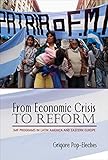From Economic Crisis to Reform : IMF Programs in Latin America and Eastern Europe / Grigore Pop-Eleches.
Material type: TextPublisher: Princeton, NJ : Princeton University Press, [2008]Copyright date: ©2009Edition: Course BookDescription: 1 online resource (368 p.) : 40 line illus. 11 tablesContent type:
TextPublisher: Princeton, NJ : Princeton University Press, [2008]Copyright date: ©2009Edition: Course BookDescription: 1 online resource (368 p.) : 40 line illus. 11 tablesContent type: - 9780691139524
- 9781400835546
- BUSINESS & -- ECONOMICS -- Development -- Business Development
- BUSINESS & -- ECONOMICS -- Development -- Economic Development
- BUSINESS & -- ECONOMICS -- Development -- General
- BUSINESS & -- ECONOMICS -- Government & -- Business
- BUSINESS & -- ECONOMICS -- Structural Adjustment
- Economic assistance -- Latin America
- Economic assistance -- Europe, Eastern
- Economic assistance -- Latin America
- Economic policy
- POLITICAL SCIENCE -- Public Policy -- Economic Policy
- BUSINESS & ECONOMICS / International / Economics
- 338.910947
- HG3881.5.I58 P67 2011
- online - DeGruyter
- Issued also in print.
| Item type | Current library | Call number | URL | Status | Notes | Barcode | |
|---|---|---|---|---|---|---|---|
 eBook
eBook
|
Biblioteca "Angelicum" Pont. Univ. S.Tommaso d'Aquino Nuvola online | online - DeGruyter (Browse shelf(Opens below)) | Online access | Not for loan (Accesso limitato) | Accesso per gli utenti autorizzati / Access for authorized users | (dgr)9781400835546 |
Frontmatter -- Contents -- List of Illustrations and Tables -- List of Abbreviations -- Preface -- 1. Introduction -- 2. A Theoretical Approach to IMF Program -- 3. Changing Crisis "Recipes": The International Drivers of IMF Programs -- 4. Navigating External Crises: Case Study Evidence -- 5. Domestic Political Responses to Economic Crises -- 6. Domestic Crisis Politics: Case Study Evidence -- 7. The Great Reconciliation?-Latin America and the IMF in the 1990s -- 8. Theoretical Conclusions and Policy Implications -- Bibliography -- Index
restricted access online access with authorization star
http://purl.org/coar/access_right/c_16ec
The wave of neoliberal economic reforms in the developing world since the 1980s has been regarded as the result of both severe economic crises and policy pressures from global financial institutions such as the International Monetary Fund (IMF). Using comparative evidence from the initiation and implementation of IMF programs in Latin America and Eastern Europe, From Economic Crisis to Reform shows that economic crises do not necessarily persuade governments to adopt IMF-style economic policies. Instead, ideology, interests, and institutions, at both the international and domestic levels, mediate responses to such crises. Grigore Pop-Eleches explains that the IMF's response to economic crises reflects the changing priorities of large IMF member countries. He argues that the IMF gives greater attention and favorable treatment to economic crises when they occur in economically or politically important countries. The book also shows how during the neoliberal consensus of the 1990s, economic crises triggered IMF-style reforms from governments across the ideological spectrum and how these reforms were broadly compatible with democratic politics. By contrast, during the Latin American debt crisis, the contentious politics of IMF programs reflected the ideological rivalries of the Cold War. Economic crises triggered ideologically divergent domestic policy responses and democracy was often at odds with economic adjustment. The author demonstrates that an economic crisis triggers neoliberal economic reforms only when the government and the IMF agree about the roots and severity of the crisis.
Issued also in print.
Mode of access: Internet via World Wide Web.
In English.
Description based on online resource; title from PDF title page (publisher's Web site, viewed 30. Aug 2021)


